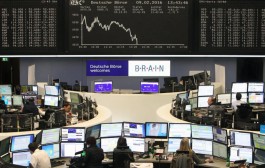Asian stocks fell after investors were affected by the latest set of Chinese economic reports, while US Treasury bonds continued to rise yesterday, Wednesday, an indication of growing expectations that the US Federal Reserve is approaching the end of its monetary policy tightening cycle.
Japanese stock markets advanced while Hong Kong and mainland China fell. Manufacturing activity in China contracted less than expected this August, while the expansion of the services PMI slowed, reducing expectations. About three stocks fell for every two that rose on the MSCI Asia-Pacific index, which was little changed.
Support the Chinese economy
The data came after officials took a series of measures to support the Chinese economy to address the slowdown in growth and the decline in business, investor and consumer confidence. The exchange rate of the yuan and the Australian dollar rose after the report was released. Shares of Baidu and SenseTime Group, which received approval to provide generative artificial intelligence services, rose.
The Australian stock market was little changed, partly affected by a decline in Qantas Airways, which fell on news of legal proceedings. South Korean stocks also fell.
The Standard & Poor's 500 index rose for the fourth day yesterday, continuing its rise this week, recording 2.5%. While the Nasdaq 100 index, which is dominated by technology stocks, advanced 3.5% this week.
Recent stock gains have partially offset August's massive losses. The Standard & Poor's 500 Index is still heading towards its worst month since last February, while the Nasdaq 100 Index is likely to fall the most this year. Asian and global stocks are also on track to record their largest losses since last February on a monthly basis.







































